外研版(三起)小学英语四年级下册知识点总结复习资料完美版教学内容
小学英语四年级下册课本知识点(外研版三年级起点)
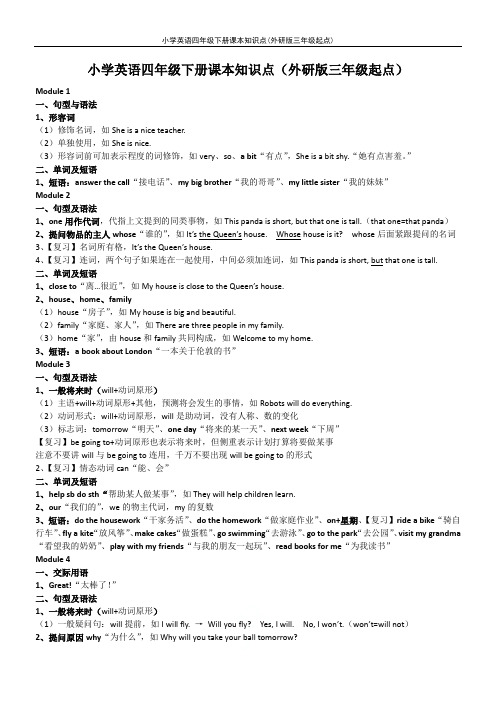
小学英语四年级下册课本知识点(外研版三年级起点)Module 1一、句型与语法1、形容词(1)修饰名词,如She is a nice teacher.(2)单独使用,如She is nice.(3)形容词前可加表示程度的词修饰,如very、so、a bit“有点”,She is a bit shy.“她有点害羞。
”二、单词及短语1、短语:answer the call“接电话”、my big brother“我的哥哥”、my little sister“我的妹妹”Module 2一、句型及语法1、one用作代词,代指上文提到的同类事物,如This panda is short, but that one is tall.(that one=that panda)2、提问物品的主人whose“谁的”,如It’s the Queen’s house. Whose house is it? whose后面紧跟提问的名词3、【复习】名词所有格,It’s the Queen’s house.4、【复习】连词,两个句子如果连在一起使用,中间必须加连词,如This panda is short, but that one is tall.二、单词及短语1、close to“离…很近”,如My house is close to the Queen’s house.2、house、home、family(1)house“房子”,如My house is big and beautiful.(2)family“家庭、家人”,如There are three people in my family.(3)home“家”,由house和family共同构成,如Welcome to my home.3、短语:a book about London“一本关于伦敦的书”Module 3一、句型及语法1、一般将来时(will+动词原形)(1)主语+will+动词原形+其他,预测将会发生的事情,如Robots will do everything.(2)动词形式:will+动词原形,will是助动词,没有人称、数的变化(3)标志词:tomorrow“明天”、one day“将来的某一天”、next week“下周”【复习】be going to+动词原形也表示将来时,但侧重表示计划打算将要做某事注意不要讲will与be going to连用,千万不要出现will be going to的形式2、【复习】情态动词can“能、会”二、单词及短语1、help sb do sth“帮助某人做某事”,如They will help children learn.2、our“我们的”,we的物主代词,my的复数3、短语:do the housework“干家务活”、do the homework“做家庭作业”、on+星期、【复习】ride a bike“骑自行车”、fly a kite“放风筝”、make cakes“做蛋糕”、go swimming“去游泳”、go to the park“去公园”、visit my grandma “看望我的奶奶”、play with my friends“与我的朋友一起玩”、read books for me“为我读书”Module 4一、交际用语1、Great!“太棒了!”二、句型及语法1、一般将来时(will+动词原形)(1)一般疑问句:will提前,如I will fly. →Will you fly? Yes, I will. No, I won’t.(won’t=will not)2、提问原因why“为什么”,如Why will you take your ball tomorrow?(1)回答:Because we are going to have a picnic tomorrow.(2)Why not?“为什么不呢”,Why won’t you do sth?=Why not do sth?eg:Why won’t you take your ball tomorrow? = Why not take your ball tomorrow?3、连词because“因为”、so“所以”,注意英语中because和so不能连用eg:Because we are going to have a picnic tomorrow, I will take my kite.We are going to have a picnic tomorrow, so I will take my kite.【复习】so“如此、这么”,如It is so hot today.4、询问天气What will be the weather?“天气怎么样?”,回答It will be+形容词,如It will be sunny.注意:will后要求加动词原形,am/is/are的原形是be,如It is sunny today. →It will be sunny tomorrow.三、单词及短语1、take“带着、拿着”,如take your kite“带着你的风筝”【复习】take“拍摄”,如take pictures“拍照”2、名词变形容词:sun-sunny、cloud-cloudy、wind-windy3、短语:have a picnic“去野餐”、【复习】in+地点,如in HaikouModule 5一、句型及语法1be动词)(1)主语+be动词过去式+其他,表示过去的情况,如I was two then.“我那时两岁”←I am ten now.“我现在十岁。
外研版小学四年级英语下学期知识点总结
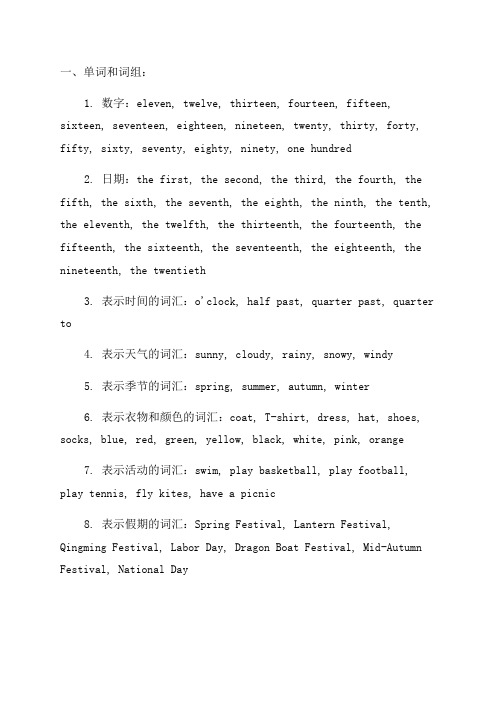
一、单词和词组:1. 数字:eleven, twelve, thirteen, fourteen, fifteen, sixteen, seventeen, eighteen, nineteen, twenty, thirty, forty, fifty, sixty, seventy, eighty, ninety, one hundred2. 日期:the first, the second, the third, the fourth, the fifth, the sixth, the seventh, the eighth, the ninth, the tenth, the eleventh, the twelfth, the thirteenth, the fourteenth, the fifteenth, the sixteenth, the seventeenth, the eighteenth, the nineteenth, the twentieth3. 表示时间的词汇:o'clock, half past, quarter past, quarter to4. 表示天气的词汇:sunny, cloudy, rainy, snowy, windy5. 表示季节的词汇:spring, summer, autumn, winter6. 表示衣物和颜色的词汇:coat, T-shirt, dress, hat, shoes, socks, blue, red, green, yellow, black, white, pink, orange7. 表示活动的词汇:swim, play basketball, play football, play tennis, fly kites, have a picnic8. 表示假期的词汇:Spring Festival, Lantern Festival, Qingming Festival, Labor Day, Dragon Boat Festival, Mid-Autumn Festival, National Day9. 形容词:big, small, tall, short, long, short, thin, fat, heavy, light, strong, weak, fast, slow, happy, sad, angry, hungry, thirsty, excited, scared, tired10. 情态动词:can, can't, could, couldn't, may, may not,will, won't, shall, shall not, must, must not二、基本句型和语法:1. 一般疑问句:Is it...? Are you...? Do you like...? Does he have...?2. 肯定回答:Yes, it is. Yes, I am. Yes, I do. Yes, he does.3. 否定回答:No, it isn't. No, I'm not. No, I don't. No, he doesn't.4.一般现在时的肯定句:主语+动词原形+其他5. 一般现在时的否定句:主语 + 动词原形 + not + 其他6. 一般现在时的一般疑问句:Do/Does + 主语 + 动词原形 + 其他?7. 一般现在时的特殊疑问句:Wh- + do/does + 主语 + 动词原形 + 其他?8. there is/there are 句型:There is + 单数名词 + 其他;There are + 复数名词 + 其他9. can/can't 句型:主语 + can/can't + 动词原形 + 其他10. could/couldn't 句型:主语 + could/couldn't + 动词原形 +其他11. can/could 提示:Can you...? Could you...? Yes, I can. Yes, I could.12. may/may not 句型:主语 + may/may not + 动词原形 + 其他13. will/won't 句型:主语 + will/won't + 动词原形 + 其他14. shall/shall not 句型:主语 + shall/shall not + 动词原形+ 其他15. must/must not 句型:主语 + must/must not + 动词原形 + 其他三、课文内容:1. Unit 1: How Do You Go There?(交通工具的使用方式)2. Unit 2: How Was Your Day Yesterday?(过去一天的活动)3. Unit 3: What's Your Hobby?(运动和爱好)4. Unit 4: What's the Day Today?(日期和天气)5. Unit 5: What Season Do You Like?(季节和天气)6. Unit 6: What Are You Wearing?(衣物和颜色)7. Unit 7: Can You Swim?(运动技能)8. Unit 8: What Did You Do in the Holidays?(假期活动)9. Unit 9: Whose Is It?(物品所有者)10. Unit 10: What Can You Do?(能力和兴趣)四、日常对话和口语表达:1. 问候:Hello! Hi! Good morning! Good afternoon! Good evening! Nice to meet you!2. 自我介绍:My name is... I am... years old. I am from...3. 询问他人的姓名和年龄:What's your name? How old are you?4. 询问他人的住所:Where do you live?5. 询问他人的过去活动:What did you do yesterday? Did you...?6. 询问他人的兴趣爱好:What's your hobby? Do you like...?7. 询问日期和天气:What's the day today? What's the weather like today?8. 询问季节和喜好:What season do you like?9. 询问衣物的颜色和穿着:What color is it? What are you wearing?10. 询问他人的能力:Can you...?以上就是外研版小学四年级英语下学期知识点的总结。
外研版(三年级起点)版小学四年级下册英语知识点讲解归纳

外研版(三年级起点)版小学四年级下册英语知识点讲解归纳本文档旨在归纳和讲解外研版(三年级起点)版小学四年级下册的英语知识点。
以下是该教材的主要内容和重点。
请注意,本文档不会对具体细节进行摘要和总结,而是提供简要的概述。
一、Unit 1: My School- 词汇: 学校设施、研究用品、科目名称- 句型: What's in the...? It's a/an...- 语法: 形容词的基本用法二、Unit 2: My Family- 词汇: 家庭成员、家居物品、情感词汇- 句型: Whose...is this/that? It's...三、Unit 3: My Friends- 词汇: 描述外貌特征、性格特点、兴趣爱好- 句型: What does he/she look like? He/She is...四、Unit 4: My Day- 词汇: 时间词、日常活动、地点名称- 句型: What do you do...? I...- 语法: 简单现在时的用法五、Unit 5: My Home- 词汇: 家庭活动、房间名称、家具物品- 句型: Do you like...? Yes, I do/No, I don't.六、Unit 6: My Town- 词汇: 地点名称、城市景点、交通工具- 句型: How do you go to...? I go by...- 语法: 方位介词的基本用法七、Unit 7: Nature- 词汇: 自然界事物、季节、天气- 句型: What's the weather like...? It's...- 语法: 一般疑问句的基本用法八、Unit 8: Fun Time- 词汇: 运动项目、游戏名称、娱乐活动- 句型: Can you...? Yes, I can/No, I can't.以上是外研版(三年级起点)版小学四年级下册的英语知识点讲解的简要归纳。
外研版(三起)小学英语四年级下册知识点归纳总结

外研版(三起)小学英语四年级下册知识点归纳总结Module 1一、单词nice 友好的,亲切的,讨人喜欢的clever 聪明的naughty 淘气的a bit 稍微,有点儿shy 害羞的answer 接(电话)call 电话;(给......)打电话bad 不好的,坏的cool 酷的aunt 姨母;姑母;舅母;伯母;婶母uncle 伯父;叔父;舅父;姑父;姨夫big 年龄较大的little 幼小的,年幼的cute 可爱的二、重点句子1. She is a nice teacher.她是一名好老师。
2. Look, the elephant is clever.看,大象很聪明。
3. Parrot is very naughty!鹦鹉很淘气。
4. This is my aunt.这是我阿姨。
5. He’s a bit shy.他有点害羞。
6. This is Maomao. She’s nice. But she’s a bit shy.这是毛毛。
她很可爱。
但是有点害羞。
三、重点句型介绍某人(是谁、性格特点)This is ... He / She is + 描写人物性格特点的形容词.eg:This is my uncle. He is tall and clever. 这是我叔叔。
他很高很聪明。
This is my teacher. She is thin and nice. 这是我的老师。
她很瘦很漂亮。
四、单词辨析little 和smalllittle 表示“小的”,带有感情色彩。
small主要指的是“尺寸”、“重量”等,本身不带任何感情色彩。
eg:I have a little sister. 我有一个小妹妹。
(含有“喜欢”的意思)The box is too small. 盒子太小了。
(单纯指的是盒子的大小)Module 2一、单词city 城市ship 船beautiful 美丽的whose 谁的queen 女王close 近的,接近的old年代久的,古老的famous 著名的景点名称:Buckingham Palace白金汉宫Big Ben大本钟Hyde Park海德公园Tower Bridge塔桥London Bridge伦敦大桥二、重点句子1. —What’s this? 这是什么?—It’s a book about London. 是关于伦敦的一本书。
(完整版)外研版小学英语(三起)四年级下册Module4Unit1教材内容全解
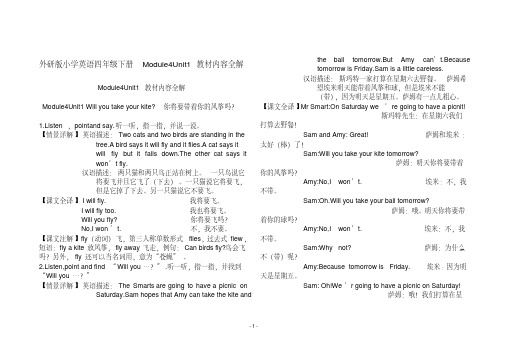
外研版小学英语四年级下册Module4Unit1教材内容全解Module4Unit1教材内容全解Module4Unit1 Will you take your kite?你将要带着你的风筝吗?1.Listen ,pointand say.听一听,指一指,并说一说。
【情景详解】英语描述:Two cats and two birds are standing in thetree.A bird says it will fly and it flies.A cat says itwill fly but it falls down.The other cat says itwon’t fly.汉语描述:两只猫和两只鸟正站在树上。
一只鸟说它将要飞并且它飞了(下去)。
一只猫说它将要飞,但是它掉了下去。
另一只猫说它不要飞。
【课文全译】I will fly. 我将要飞。
I will fly too. 我也将要飞。
Will you fly? 你将要飞吗?No,I won’t. 不,我不要。
【课文注解】fly(动词)飞,第三人称单数形式flies,过去式flew,短语:fly a kite放风筝,fly away飞走,例句:Can birds fly?鸟会飞吗?另外,fly还可以当名词用,意为“苍蝇”。
2.Listen,point and find“Will you…?”.听一听,指一指,并找到“Will you…?”【情景详解】英语描述:The Smarts are going to have a picnic onSaturday.Sam hopes that Amy can take the kite andthe ball tomorrow.But Amy can’t.Becausetomorrow is Friday.Sam is a little careless.汉语描述:斯玛特一家打算在星期六去野餐。
外研版(三起)小学英语四年级下册知识点总结复习资料完美版

1. One day, robots will do everything. 总有一天, 机器人会 做一切事情。
2. A: Will they do the housewo.\No , they won ’不 t, .它
们不会。
这只熊猫很矮,
7.It ’s very big and very beautiful. 它非常大而且非常漂亮。 8. My house is very small, but it ’s beautiful. 我的家非常 小,但它非常美丽。
Module 3 重点单词:
robot 机器人 will 将,将会
Tuesday 星期二 Wednesday 星期三 Thursday 星期四 Friday 星期五 have 有,拥有 next 下一个的 week 星期,周 holiday 假期
短语: will + 动词(原形)表示“将来做 ...”1、 do everything 做所有事 2、 fly a kite 放风筝
1. She is a nice teacher. 她是一位友善的老师。 2. Parrot is very naughty! But he ’s not a bad bird. 帕洛特 非常淘气,但他不是一只坏鸟。
3. Xiaoyong is a very clever boy. 小勇是一个非常聪明的 男孩。 4. This is my mother. She is very nice. 这是我妈妈, 她很好
1
8、 go swimming 去游泳 9、 play with my friends 和我的朋友玩 10 、 go to the park 去公园 11 、 do my homework 做我的作业 12 、 visit my grandma 拜访我的奶奶 13 、 help my mother 帮助我妈妈(做家务) 14 、 read my books 看我的书 15 、 one day 将来(有一天) 16 、 ride a bike 骑自行车 17 、 make cakes 做蛋糕 重点句型:
外研版(三起)小学英语四年级下册Module 8模块知识点汇总

外研版(三起)小学英语四年级下册Module8知识点汇总重点单词:sang(sing的过去式)唱歌beautifully优美地,动听的saw(see的过去式)看见game游戏;比赛last最近过去的fun有趣的事went(go的过去式)去there在那儿,往那里ate(eat的过去式)吃drank(drink的过去式)喝,饮drink饮料time一段时间have a good time玩得开心busy忙的,忙碌的took(take的过去式)拍摄tell告诉,告知great非常好的,令人愉快的delicious美味的,可口的made(make的过去式)做,制作poster海报,招贴画动词过去式(不规则)sing——sang have——had go——went see——saw eat——ate drink——drank take——took make——made短语:1.have a picnic进行野餐2.go there去那儿3.see some bird看见一些小鸟4.sing beautiful唱歌动听5.eat some food吃一些食物6.drink some drinks喝一些饮料7.play games玩游戏8.have a busy day度过忙碌的一天9.take some pictures拍一些照片10.sing sangs唱歌11.make a poster制作一张海报重点句型:1.They sang beautifully.它们唱得很动听。
2.You had a good time!你玩得真开心!3.We walked in the park,we listened to the music,we sang and danced.我们在公园里散步,听音乐,我们又唱又跳。
4.I took some pictures and drank some drinks.我拍了一些照片并制作了一张海报。
最新外研版(三起)小学英语四年级下册知识点总结复习资料完美版

Friday 星期五 短语:
Saturday 星期六
Sunday 星期日
1、 in London 在伦敦 2、 on Saturday 在星期六 3、 have a picnic 举行、进行野餐
4、 take your kite / ball 带上你的风筝 /球 5、 The Weather Tomorrow 明天的天气(情况) 6、 be windy 刮风的
7、 on the river 在河上
8、 Big Ben
大本钟
9、 Hyde Park 海德公园
10、 Tower Bridge 塔桥
重点句型:
1. This is a book about London. 这是一本关于伦敦的书 . 2. London is a big city. 伦敦是个大城市 .
6、 next week 下周 7、 a holiday 一个假期 8、 go swimming 去游泳
9、 play with my friends 和我的朋友玩 10、 go to the park 去公园 11、 do my homework 做我的作业 12、 visit my grandma 拜访我的奶奶 13、 help my mother 帮助我妈妈(做家务) 14、 read my books 看我的书 15、 one day 将来(有一天)
它们不会 .
3、 On Monday I ’ll go swimming. 我星期一去游泳 . 4、 Sam can ride a bike. 萨姆会骑自行车 .
5、 Today is Monday , and tomorrow is Tuesday. 今天是 周一,明天是周二 .
6、And one day , it will read books for me. 将来有一天, 它将会为我读书 .
四年级下英语教案-复习 Module 3-外研社(三起)
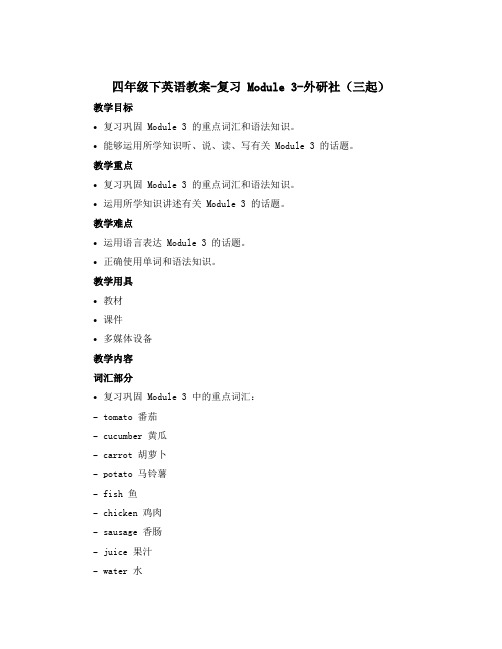
四年级下英语教案-复习 Module 3-外研社(三起)教学目标•复习巩固 Module 3 的重点词汇和语法知识。
•能够运用所学知识听、说、读、写有关 Module 3 的话题。
教学重点•复习巩固 Module 3 的重点词汇和语法知识。
•运用所学知识讲述有关 Module 3 的话题。
教学难点•运用语言表达 Module 3 的话题。
•正确使用单词和语法知识。
教学用具•教材•课件•多媒体设备教学内容词汇部分•复习巩固 Module 3 中的重点词汇:–tomato 番茄–cucumber 黄瓜–carrot 胡萝卜–potato 马铃薯–fish 鱼–chicken 鸡肉–sausage 香肠–juice 果汁–water 水–milk 牛奶语法部分•复习巩固 Module 3 中的语法知识:–How much…? 多少钱?–It’s… 这是……元。
句型训练•请同学们使用以下句型向其他同学介绍一个人所喜欢的食物:–My favorite food is…–I like to eat…–I love…–他/她喜欢吃……听力训练1.听以下录音,回答问题:Q:What does Cindy want to drink?A: Cindy wants to drink juice.2.听以下录音,判断句子是否正确:1. Sally likes to eat fish. √2. Sally doesn't like to eat fish.3. Sally likes to eat chicken.4. Sally doesn't like to eat chicken. √读写训练•阅读以下对话,完成问答:A: How much is that sausage?B: It's 10 yuan.A: And the drink?B: It's 3 yuan.A: OK, I'll take one sausage and a drink.Q: How much is the sausage?A: It's 10 yuan.Q: How much is the drink?A: It's 3 yuan.Q: What does A want to buy?A: A wants to buy one sausage and a drink.作业布置•完成练习册 Module 3 相应的练习题。
外研版小学英语四年级(下册)知识点总结复习资料全

外研版四年级英语下册总结Module 1 重点单词:nice 好的友善的 a bit 有一点shy 害羞的 clever 聪明的aunt 姨姑naughty 淘气的little 小的年幼的cute 可爱的uncle 叔舅短语1、my friends 我的朋友们2、a bit shy 一点儿害羞的2、a nice teacher 一位友好的老师4、a clever pupil 一个聪明的小学生5、a very naughty bird 一只非常淘气的鸟儿 6 my big brother我的大兄弟(哥哥)7、my little sister我的小妹妹重点句型:1. She is a nice teacher. 她是一位友善的老师。
2. Parrot is very naughty . 鹦鹉非常淘气。
3. Xiaoyong is a very clever boy. 小勇是一个非常聪明的男孩。
4. This is my mother. She is very nice.这是我妈妈,她很好。
Module 2重点单词:about 关于 beautiful 美丽的 long 长的 many 很多 old 古老的 famous 著名的短语1、一本关于伦敦的书a book about London2、来自…(是…人)be from…3、英国的首都the capital of England4、白金汉宫Buckingham Palace5、女王的房子the Queen’s house6、泰晤士河the River Thames7、在河上on the river 8、大本钟Big Ben9、海德公园Hyde Park 10、塔桥Tower Bridge重点句型:1. This is a book about London. 这是一本关于伦敦的书。
2. London is a big city. 伦敦是个大城市。
3.Whose house is it? 这是谁的房子?it’s the Queen’s house这是女王的房子4. A: Is it your house? 那是你的房子吗?B:No, it’s the Queen’s house.不,那是女王的房子。
外研版小学英语(三起)四年级下学期四种时态总复习

外研版小学英语(三起)四年级下学期四种时态总复习如: What do you often do after school ? ▲2)当主语为第三人称单数时 ,助动词为does。
一般现在时 (有be无实义动词,有实义动词无be)一、意义:表示经常发生的事情、动作或存在的状态。
二、构成及变化:1.be(am,is,are)动词的变化。
肯定句:主语+be(am,is,are)+其它。
如: I am a boy.我是一个男孩。
否定句:主语+ be(am,is,are) + not +其它。
如:He is not a worker.他不是工人。
一般疑问句:Be(am,is,are) +主语+其它? 如:-Are you a student?-Yes. I am./ No,I'm not.特殊疑问句:特殊疑问词+一般疑问句语序?如:Where is my bike? 2. 实义动词(行为动词)的变化。
▲1)当主语为第一、第二人称及各人称的复数时,助动词为do。
肯定句:主语+动词原形+其它。
如:We often play basketball after school.否定句:主语+ don't+动词原形+其它。
如:we don?t play basketball after school.一般疑问句:Do +主语+动词原形+其它?如:Do you often play basketball after school?Yes, we do./ No,we don't.特殊疑问句:特殊疑问词+以do开头的一般疑问句语序?- 1 -肯定句:主语+动词单三形式+其它。
如: He swims well.否定句:主语+ doesn’t+动词原形+其它。
如:He doesn?t swim well. 一般疑问句:Does +主语+动词原形+其它?如:Does he swim well ? Yes, he does. / No, he doesn't.特殊疑问句:特殊疑问词+以does开头的一般疑问句语序?如:How does your father go to work?三、第三人称单数的动词变化规则(只有在第三人称为主语的肯定句中动词才用单三形式)。
外研版小学英语(三起)四年级下册Module3Unit2教材内容全解

外研版⼩学英语(三起)四年级下册Module3Unit2教材内容全解外研版⼩学英语四年级下册Module3Unit2教材内容全解Module3Unit2教材内容全解Module3Unit2 On Monday I’ll go swimming.在星期⼀我将要去游泳。
1.Listen and chant.听⼀听,并说唱。
【情景详解】英语描述:There are seven days in a week. They areSunday, Monday,Tuesday,Wednesday,Thursday,FridayandSaturday.汉语描述:⼀星期有七天。
它们是星期⽇、星期⼀、星期⼆、星期三、星期四、星期五和星期六。
【课⽂全译】Sunday,Monday,Tuesday,Wednesday,Thursday,Friday.星期⽇、星期⼀、星期⼆、星期三、星期四、星期五。
And we will have Saturday. 我们将会迎来星期六。
【课⽂注解】①Tuesday(名词)星期⼆,缩写形式Tue.②Wednesday(名词)星期三,缩写Wed. 例句:It’s Wednesday today.今天是星期三。
③Thursday(名词)星期四,缩写Thur.④Friday(名词)星期五,联想:Monday星期⼀,缩写形式Fri.例句:I go to school on Friday.我在星期五去上学。
⑤have(动词)有,拥有,第三⼈称单数has,动词-ing形式having,过去式had,例句:I have a pen.我有⼀⽀钢笔。
We have four classes in the morning.我们上午有四节课。
【拓展记忆】have还可意为“吃;喝;患病”等,短语:have(eat)breakfast吃早餐,have (drink)some water喝些⽔,have a cold感冒2.Listen and say.听⼀听,说⼀说。
外研社(三起)四下期末知识点汇总

外研社英语(三起)四年级下册期末知识点汇总外研三起四年级下册Module 1知识汇总一、词汇nice友好的,亲切的,讨人喜欢的clever聪明的naughty淘气的a bit稍微,有点儿shy害羞的answer接(电话)call电话;(给......)打电话bad不好的,坏的cool酷的aunt姨母;姑母;舅母;伯母;婶母uncle伯父;叔父;舅父;姑父;姨夫big年龄较大的little幼小的,年幼的cute可爱的二、句子1. She is a nice teacher. 她是一名好老师。
2. Look, the elephant is clever. 看,大象很聪明。
3. Parrot is very naughty! 鹦鹉很淘气。
4. This is my aunt. 这是我阿姨。
5. He’s a bit shy. 他有点害羞。
6. This is Maomao. She’s nice. But she’s a bit shy. 这是毛毛。
她很可爱。
但是有点害羞。
三、句型结构介绍某人(是谁、性格特点)This is ... He / She is + 描写人物性格特点的形容词.eg: This is my uncle. He is tall and clever. 这是我叔叔。
他很高很聪明。
This is my teacher. She is thin and nice. 这是我的老师。
她很瘦很漂亮。
四、单词辨析little 和smalllittle 表示“小的”,带有感情色彩small主要指的是“尺寸”、“重量”等,本身不带任何感情色彩eg: I have a little sister. 我有一个小妹妹。
(含有“喜欢”的意思)The box is too small. 盒子太小了。
(单纯指的是盒子的大小)外研三起四年级下册Module 2知识汇总一、词汇city城市ship船beautiful美丽的whose谁的queen女王close近的,接近的old年代久的,古老的famous著名的景点名称:Buckingham Palace白金汉宫Big Ben大本钟Hyde Park海德公园Tower Bridge塔桥London Bridge伦敦大桥二、句子1. —What’s this? 这是什么?—It’s a book about London. 是关于伦敦的一本书。
外研版三起英语四年级下册知识点复习总结全
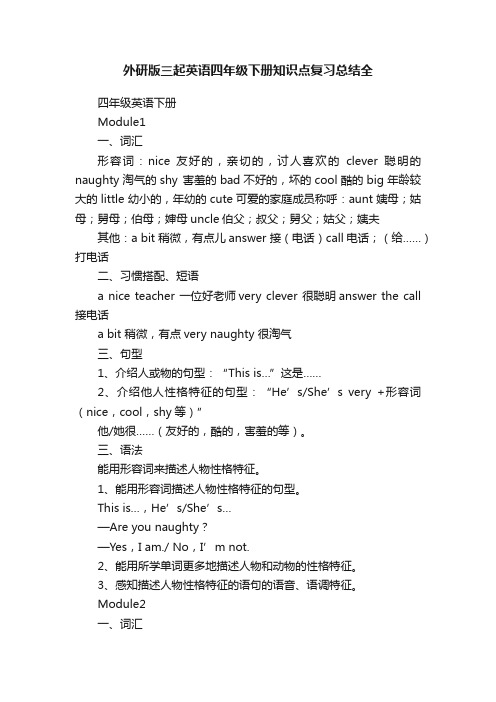
外研版三起英语四年级下册知识点复习总结全四年级英语下册Module1一、词汇形容词:nice 友好的,亲切的,讨人喜欢的clever聪明的naughty淘气的shy 害羞的bad不好的,坏的cool酷的big年龄较大的little幼小的,年幼的cute可爱的家庭成员称呼:aunt姨母;姑母;舅母;伯母;婶母uncle伯父;叔父;舅父;姑父;姨夫其他:a bit 稍微,有点儿answer 接(电话)call电话;(给……)打电话二、习惯搭配、短语a nice teacher 一位好老师very clever 很聪明answer the call 接电话a bit 稍微,有点very naughty 很淘气三、句型1、介绍人或物的句型:“This is…”这是……2、介绍他人性格特征的句型:“He’s/She’s very +形容词(nice,cool,shy等)”他/她很……(友好的,酷的,害羞的等)。
三、语法能用形容词来描述人物性格特征。
1、能用形容词描述人物性格特征的句型。
This is…,He’s/She’s…—Are you naughty?—Yes,I am./ No,I’m not.2、能用所学单词更多地描述人物和动物的性格特征。
3、感知描述人物性格特征的语句的语音、语调特征。
Module2一、词汇交通工具类:ship船形容词:beautiful美丽的,old年代久远的,古老的,close近的,接近的,famous著名的疑问词:whose谁的其他:city城市,queen女王二、习惯搭配、短语this panda 这只熊猫the one那一个a big city 一座大城市very beautiful 很漂亮close to 接近… a book about London一本关于伦敦的书the Queen’s house 女王的房子very famous 很著名的三、句型1、介绍景物名称及景物特点懂得句型:This is +景物名称. It’s very+形容词(beautiful,famous…).2、有关景物是什么的句型:—What is this?—It’s +(物品名词).四、语法能用形容词来描述一座城市、一处景物或一件物品。
外研版三年级起点四年级下册英语知识点

外研版三年级起点四年级下册英语知识点在学习英语的过程中,外研版三年级起点四年级下册的知识点是非常重要的一部分。
通过学习这些知识点,学生能够更加系统地掌握英语语言的基本规则和常用词汇,为日后的英语学习奠定坚实的基础。
下面就让我们来深入探讨一下外研版三年级起点四年级下册的英语知识点。
1. 词汇在这个阶段,学生将会学习一些日常生活中常用的词汇,包括颜色、水果、动物、食物等,通过这些词汇的学习,学生可以更好地理解和表达自己身边的事物。
还会学习一些常用的动词和形容词,使他们能够更加准确地描述事件和事物。
2. 语法在外研版三年级起点四年级下册的英语知识点中,语法也是非常重要的一环。
学生将会学习一些基本的语法知识,比如名词的复数形式、动词的时态等。
通过这些知识点的学习,学生可以更好地理解英语句子的构成规则,从而能够更加流利地表达自己的意思。
3. 句型在这个阶段,学生将会学习一些基本的句型结构,比如肯定句、否定句和疑问句等。
这些句型的学习可以帮助学生更好地理解英语句子的构成方式,从而能够更加灵活地运用英语进行交流和表达。
4. 阅读和写作在外研版三年级起点四年级下册的英语知识点中,阅读和写作也是非常重要的一部分。
通过阅读一些简单的短文和故事,学生可以更好地理解英语文章的结构和逻辑,同时也能够扩大自己的词汇量。
通过写作一些简单的句子和段落,学生可以更好地巩固所学知识,提高自己的英语表达能力。
在外研版三年级起点四年级下册的英语知识点中,词汇、语法、句型、阅读和写作等方面的学习都是非常重要的。
这些知识点的掌握不仅能够帮助学生更好地理解和使用英语,也为他们日后的英语学习打下坚实的基础。
希望同学们能够认真对待这些知识点的学习,从而能够在英语学习的道路上取得更加优异的成绩。
外研版三年级起点四年级下册英语知识点的学习,对学生的语言能力和交际能力起着至关重要的作用。
这个阶段的学习不仅仅是为了应付考试,更重要的是为了日后的英语学习和实际运用打下坚实的基础。
外研版三起小学英语四年级下册知识点总结复习资料完美版
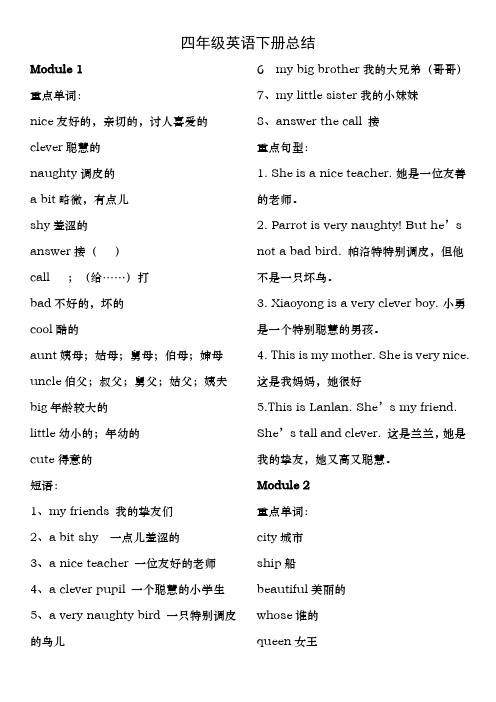
四年级英语下册总结Module 1重点单词:nice友好的,亲切的,讨人喜爱的clever聪慧的naughty调皮的a bit略微,有点儿shy羞涩的answer接()call ;(给……)打bad不好的,坏的cool酷的aunt姨母;姑母;舅母;伯母;婶母uncle伯父;叔父;舅父;姑父;姨夫big年龄较大的little幼小的;年幼的cute得意的短语:1、my friends 我的挚友们2、a bit shy 一点儿羞涩的3、a nice teacher 一位友好的老师4、a clever pupil 一个聪慧的小学生5、a very naughty bird 一只特别调皮的鸟儿6 my big brother我的大兄弟(哥哥)7、my little sister我的小妹妹8、answer the call 接重点句型:1. She is a nice teacher. 她是一位友善的老师。
2. Parrot is very naughty! But he’s not a bad bird. 帕洛特特别调皮,但他不是一只坏鸟。
3. Xiaoyong is a very clever boy. 小勇是一个特别聪慧的男孩。
4. This is my mother. She is very nice.这是我妈妈,她很好5.This is Lanlan. She’s my friend. She’s tall and clever. 这是兰兰,她是我的挚友,她又高又聪慧。
Module 2重点单词:city城市ship船beautiful美丽的whose谁的queen女王close近的,接近的old年头久的,古老的famous闻名的短语1、a book about London 一本关于伦敦的书2、be from…来自…(是…人)3、the capital of England 英国的首都4、Buckingham Palace 白金汉宫5、the Queen’s house 女王的房子6、the River Thames 泰晤士河7、on the river 在河上8、Big Ben 大本钟9、Hyde Park 海德公园10、Tower Bridge 塔桥重点句型:1. This is a book about London. 这是一本关于伦敦的书。
- 1、下载文档前请自行甄别文档内容的完整性,平台不提供额外的编辑、内容补充、找答案等附加服务。
- 2、"仅部分预览"的文档,不可在线预览部分如存在完整性等问题,可反馈申请退款(可完整预览的文档不适用该条件!)。
- 3、如文档侵犯您的权益,请联系客服反馈,我们会尽快为您处理(人工客服工作时间:9:00-18:30)。
四年级英语下册总结Module 1重点单词:nice友好的,亲切的,讨人喜欢的clever聪明的naughty淘气的a bit稍微,有点儿shy害羞的answer接(电话)call电话;(给……)打电话bad不好的,坏的cool酷的aunt姨母;姑母;舅母;伯母;婶母uncle伯父;叔父;舅父;姑父;姨夫big年龄较大的little幼小的;年幼的cute可爱的短语:1、my friends 我的朋友们2、a bit shy 一点儿害羞的3、a nice teacher 一位友好的老师4、a clever pupil 一个聪明的小学生5、a very naughty bird 一只非常淘气的鸟儿6 my big brother我的大兄弟(哥哥)7、my little sister我的小妹妹8、answer the call 接电话重点句型:1. She is a nice teacher. 她是一位友善的老师。
2. Parrot is very naughty! But he’s not a bad bird. 帕洛特非常淘气,但他不是一只坏鸟。
3. Xiaoyong is a very clever boy. 小勇是一个非常聪明的男孩。
4. This is my mother. She is very nice.这是我妈妈,她很好5.This is Lanlan. She’s my friend. She’s tall and clever. 这是兰兰,她是我的朋友,她又高又聪明。
Module 2重点单词:city城市ship船beautiful美丽的whose谁的queen女王close近的,接近的old年代久的,古老的famous著名的短语1、a book about London 一本关于伦敦的书2、be from…来自…(是…人)3、the capital of England 英国的首都4、Buckingham Palace 白金汉宫5、the Queen’s house 女王的房子6、the River Thames 泰晤士河7、on the river 在河上8、Big Ben 大本钟9、Hyde Park 海德公园10、Tower Bridge 塔桥重点句型:1. This is a book about London. 这是一本关于伦敦的书。
2. London is a big city. 伦敦是个大城市。
3.A:Whose house is it? 这是谁的房子?B:I t’s the Queen’s house这是女王的房子4. A: Is it your house? 那是你的房子吗?B: No, it’s the Queen’s house.不,那是女王的房子。
5. This is Hyde Park. It’s very beautiful. 这是海德公园,它非常漂亮。
6. This panda is short, but that one is tall. 这只熊猫很矮,但那只很高。
7.It’s very big and very beautiful.它非常大而且非常漂亮。
8. My house is very small, but it’s beautiful. 我的家非常小,但它非常美丽。
Module 3重点单词:robot机器人will将,将会everything所有事情one day(将来)有一天housework家务活learn学习our我们的homework家庭作业won't = will not将不会Tuesday星期二Wednesday星期三Thursday星期四Friday星期五have有,拥有next下一个的week星期,周holiday假期短语:will + 动词(原形)表示“将来做...”1、do everything 做所有事2、fly a kite 放风筝3、do the housework 做家务4、help children learn帮助孩子们学习5、do our homework 做我们的作业6、next week 下周7、a holiday 一个假期8、go swimming 去游泳9、play with my friends和我的朋友玩10、go to the park 去公园11、do my homework 做我的作业12、visit my grandma 拜访我的奶奶13、help my mother 帮助我妈妈(做家务)14、read my books 看我的书15、one day 将来(有一天)16、ride a bike 骑自行车17、make cakes 做蛋糕重点句型:1. One day, robots will do everything.总有一天,机器人会做一切事情。
2. A: Will they do the housework? 他们会做家务吗?B: Yes, they will.是的,它们会.\No,they won’t.不,它们不会。
3、On Monday I’ll go swimming. 我星期一去游泳。
4、Sam can ride a bike. 萨姆会骑自行车。
5、Today is Monday, and tomorrow is Tuesday. 今天是周一,明天是周二。
6、And one day, it will read books for me. 将来有一天,它将会为我读书。
Module 4重点单词take带,拿fly飞picnic野餐great太好了,好极了why为什么Why not?为什么不呢?because因为so所以cloudy多云的weather天气Monday 星期一Tuesday 星期二Wednesday 星期三Thursday 星期四Friday 星期五Saturday 星期六Sunday 星期日短语:1、in London 在伦敦2、on Saturday 在星期六3、have a picnic 举行、进行野餐4、take your kite / ball带上你的风筝/球5、The Weather Tomorrow 明天的天气(情况)6、be windy 刮风的7、be hot 炎热的8、be cold 寒冷的9、be sunny 晴朗的10、rain 下雨11、snow 下雪12、why not 为什么不呢重点句型:1. A: Will you take your kite tomorrow? 明天你带着你的风筝吗?B: Yes, I will.\ No, I won’t.是的,我会。
\不,我不会。
2. On Saturday we’re going to have a picnic.星期六我们要去野餐。
3. A: Why not? 为什么不呢?B:Because tomorrow is Friday .因为明天是周五。
4. A: What will Shanshan do on Monday? 姗姗星期一要干什么?B: On Monday she’ll play with her friend.周一她会和朋友们玩。
5. A:Will it be windy in Beijing? 北京会有风吗?B:Yes, it will.是的,会.\No, it won’t.不,不会。
6.What will the weather be today?今天的天气将会怎样?Module 5重点单词:was(am,is的过去式)是then当时,那时grandparent祖父;祖母;外祖父;外祖母were(are的过去式)是young年轻的old老的,年老的hair头发so这么,那么short短的long长的wasn't = was not不是weren't = were not不是clean干净的dirty脏的短语:1、过去式:发生在过去的事情用过去常和then(那时)或yesterday(昨天)一起用2、be动词过去式:①was ( is/am的过去式)→我(I)、他(he、she、it)、第一人称+ was②were ( are的过去式)→你(们)(You)他们(they)我们(we)+were③否定式:wasn't weren't3、反义词then(那时)——now(现在)old(老的)——young(年轻的)long(长的)——short(短的)big(大的)——small(小的)good(好的)——bad(差的)tall(高的)——short(矮的)fat(胖的)——thin(瘦的)clean(干净的)——dirty(脏的)4、that little girl那个小女孩5、so short如此矮6、so cute如此可爱7、my grandparents 我的(外)祖父母8、her hair 她的头发重点句型:1.I was two then. 我那时候2岁。
2.Who is that little girl?那个小女孩是谁?3.They were young then. 他们那时候很年轻。
4.It wasn’t clean then.It is clean now。
它之前很不干净,它现在很干净。
5.Your hair was so short.你的头发这么短。
6.A:Who are they, Lingling? 玲玲,他们是谁?B:They are my grandparents.他们是我的(外)祖父母。
Module 6重点单词:yesterday昨天out不在家(的);在外面(的)well健康的thanks谢谢sun太阳lesson一节课,一堂课village乡村,村子短语:1、at school 在学校2、at the zoo 在动物园3、play in the sun 在阳光下玩耍4、at home 在家5、Chinese Lesson 语文课6、a very small village 一个非常小的乡村7、at the park 在公园8、a big city 一个大城市9、very well 非常好重点句型:1. A: Were you at home yesterday? 你昨天在家吗?B: Yes, I was./No, I wasn’t.是的,我在。
/不,我不在。
2.Was it sunny in London yesterday?伦敦昨天是晴天吗?Yes,it was. / No it wasn’t.3.Was it a big city then? 它过去是个大城市吗?4.It was a very small village then.它过去是个小村庄。
